Abstract
STUDY OBJECTIVE: To assess the short term relationship between air pollution and the daily number of emergency hospital admissions for respiratory disease. DESIGN: Data were analysed using autoregressive Poisson regression allowing for overdispersion and controlling for possible confounding factors such as seasonal and other chronological variables, meteorological factors, and influenza epidemics. SETTING: The two major cities in The Netherlands-Amsterdam (694,700 inhabitants) and Rotterdam (576,200 inhabitants). PARTICIPANTS AND MEASUREMENTS: Emergency hospital admissions for respiratory diseases, registered on a daily basis by the National Medical Registration, for the period 1977-89 were used. ICD-9 codes included were: respiratory (460-519), chronic obstructive pulmonary disease (490-492, 494, 496), and asthma (493). The mean (range) of the total daily number of admissions for these three classifications were as follows: 6.70 (0-23), 1.74 (0-9) and 1.13 (0-7) respectively in Amsterdam and 4.79 (0-19), 1.57 (0-9), and 0.53 (0-5) in Rotterdam. Air pollution measurements were provided by the National Institute of Public Health and Environmental Protection. In The Netherlands, air pollution is at a low to moderate ("summer type") or a low ("winter type") level. The levels in Amsterdam and Rotterdam did not differ much for the "summer type". For 1977-89 the mean (range) values of ozone (O3), the "summer type" pollutant (O3-8 h), were 86 (0-252) micrograms/m3 in Amsterdam and 82 (0-286) micrograms/m3 in Rotterdam. The mean (range) of the values "winter type", pollutant, sulphur dioxide (SO2-24 h), were 38 (0-381) micrograms/m3 in Amsterdam and 50 (1-379) micrograms/m3 in Rotterdam. For black smoke (BS-24 h), values were 14 (1-84) micrograms/m3 and 28 (1-144) micrograms/m3 respectively (1986-89). MAIN RESULTS: Ozone had a non-significant positive effect on the number of respiratory emergency admissions in summer in people aged > or = 65 years (relative risk for a 100 micrograms/m3 increase in O3-8 h of 1.127 (0.983, 1.292) in Amsterdam and a significant positive effect of 1.344 (1.097, 1.647) in 1977-81 in Rotterdam). Sulphur dioxide did not show any clear effects; in Amsterdam a significant negative effect was even found. The same was true for nitrogen dioxide in Amsterdam; in Rotterdam, however, nitrogen dioxide showed non-significant positive effects (RR 0.965, 1.342). Black smoke did not show any clear effects in Amsterdam; in Rotterdam it was positively but not significantly related to the number of admissions. CONCLUSIONS: The results show that the relation between short term air pollution and emergency hospital admissions is not always consistent at these rather low levels of daily hospital admissions and of air pollution.
Full text
PDF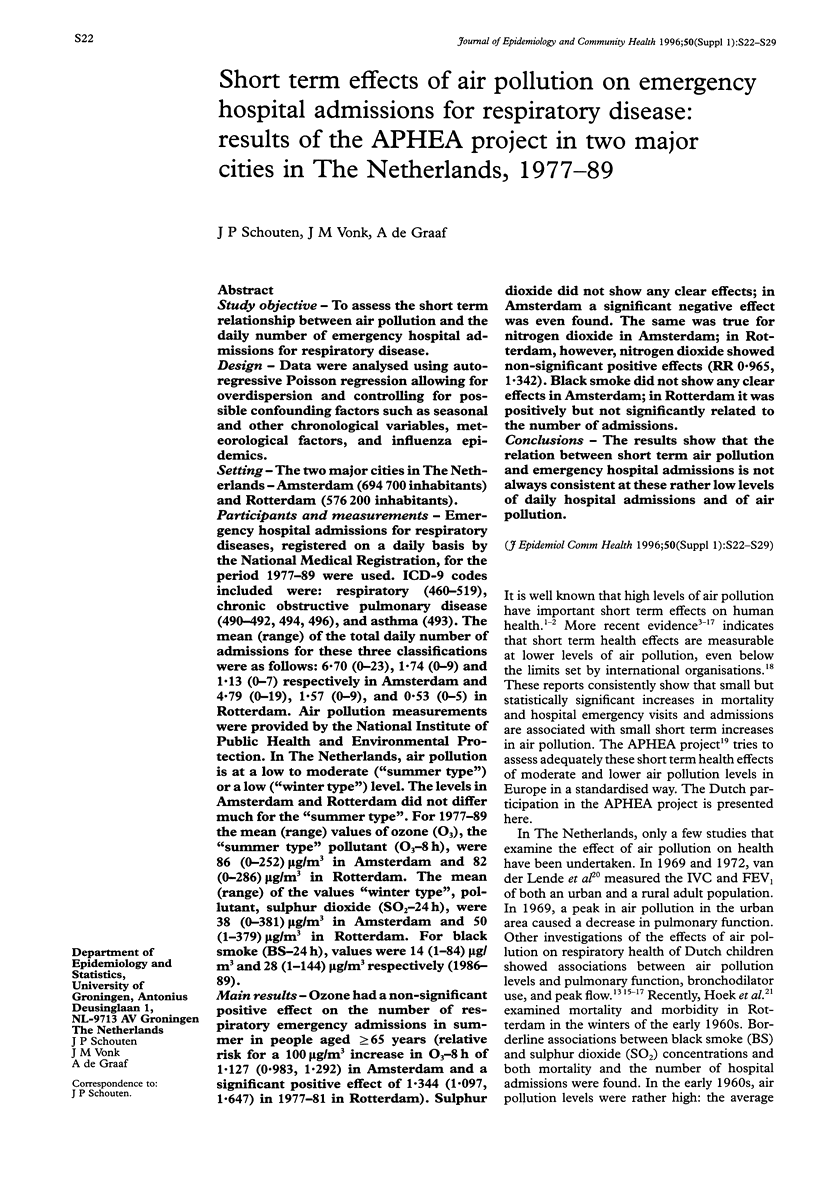
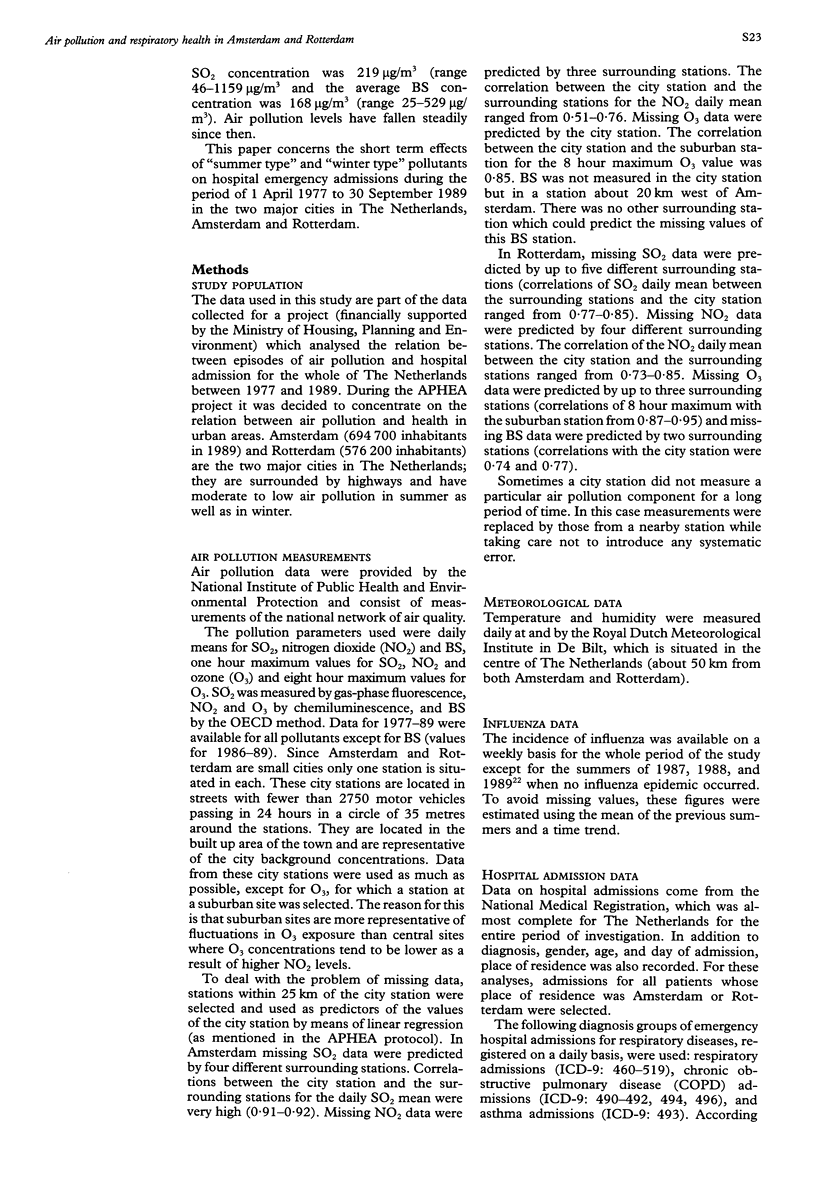
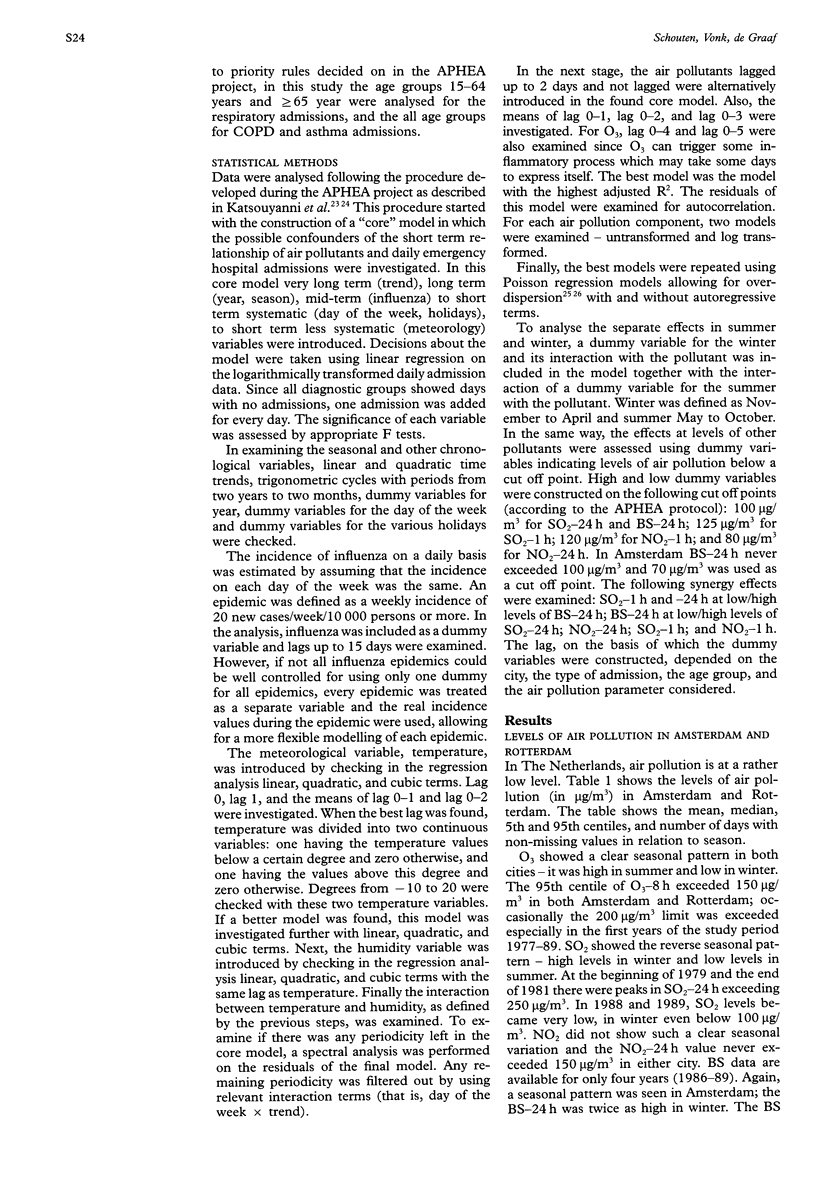
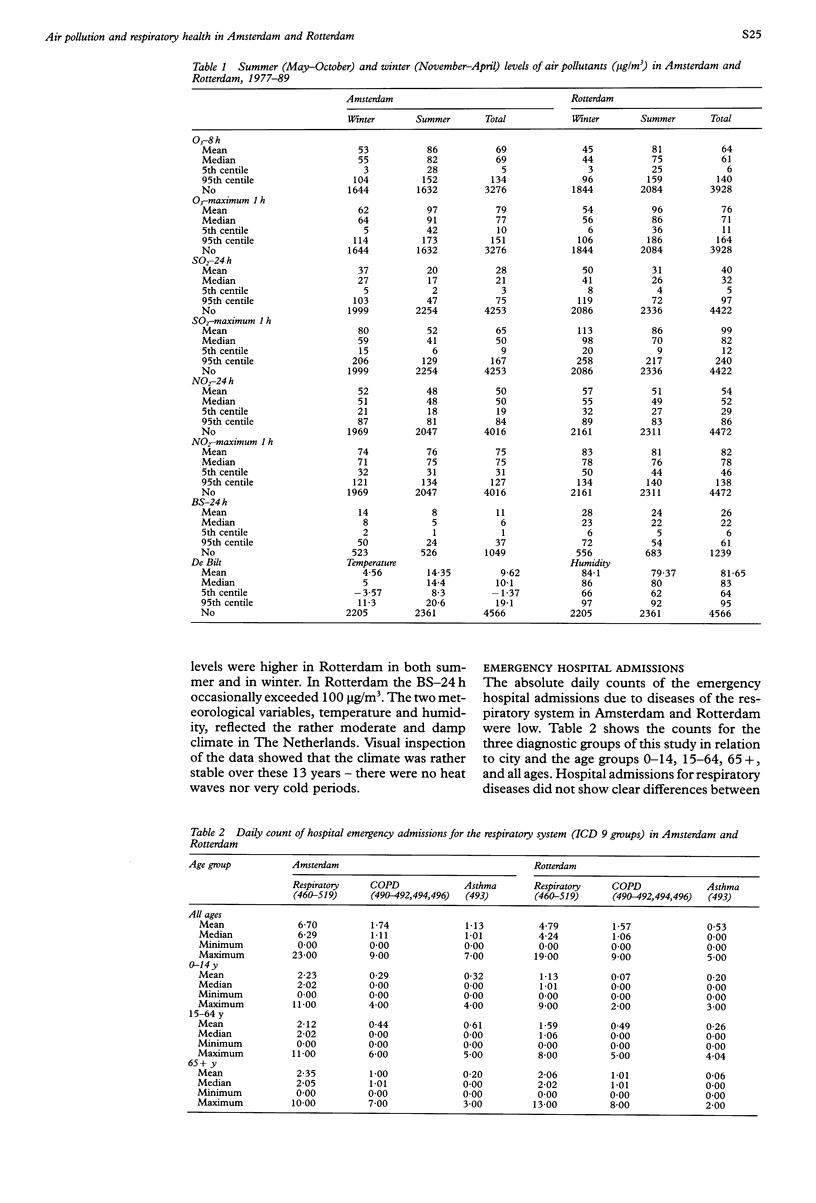
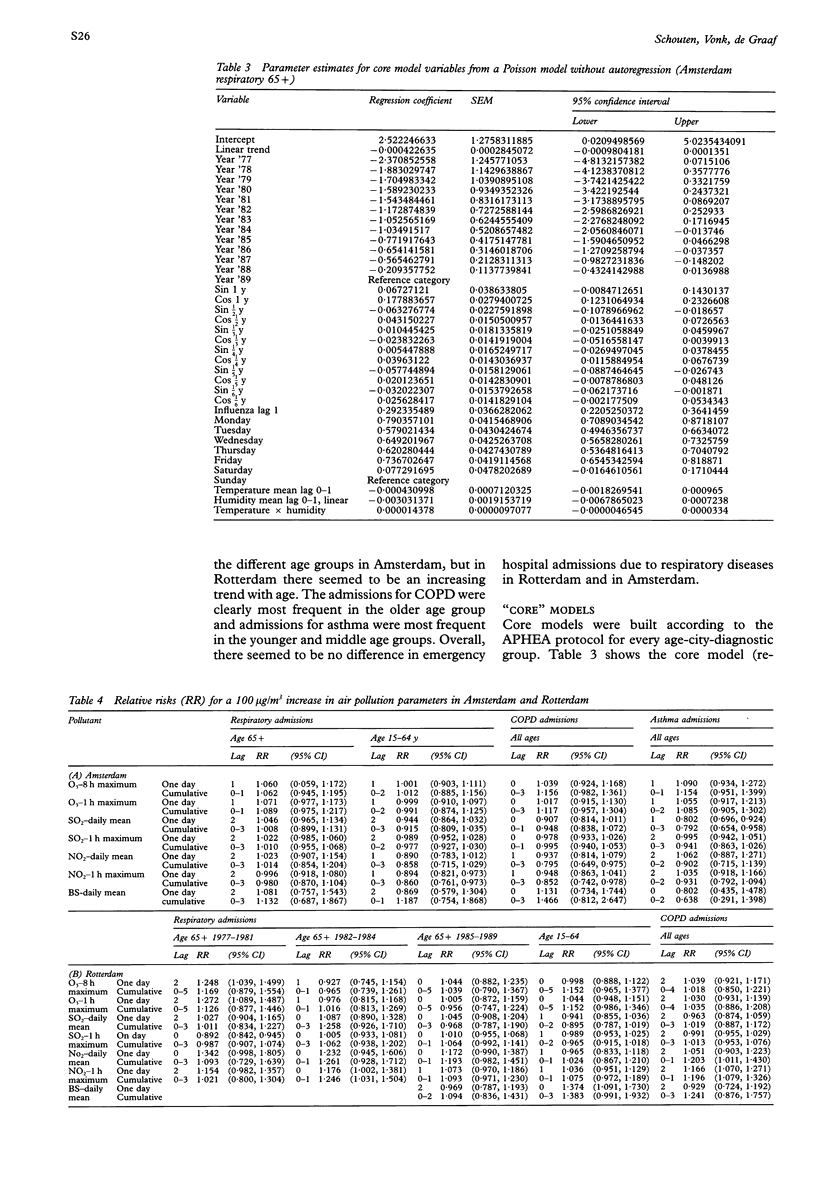
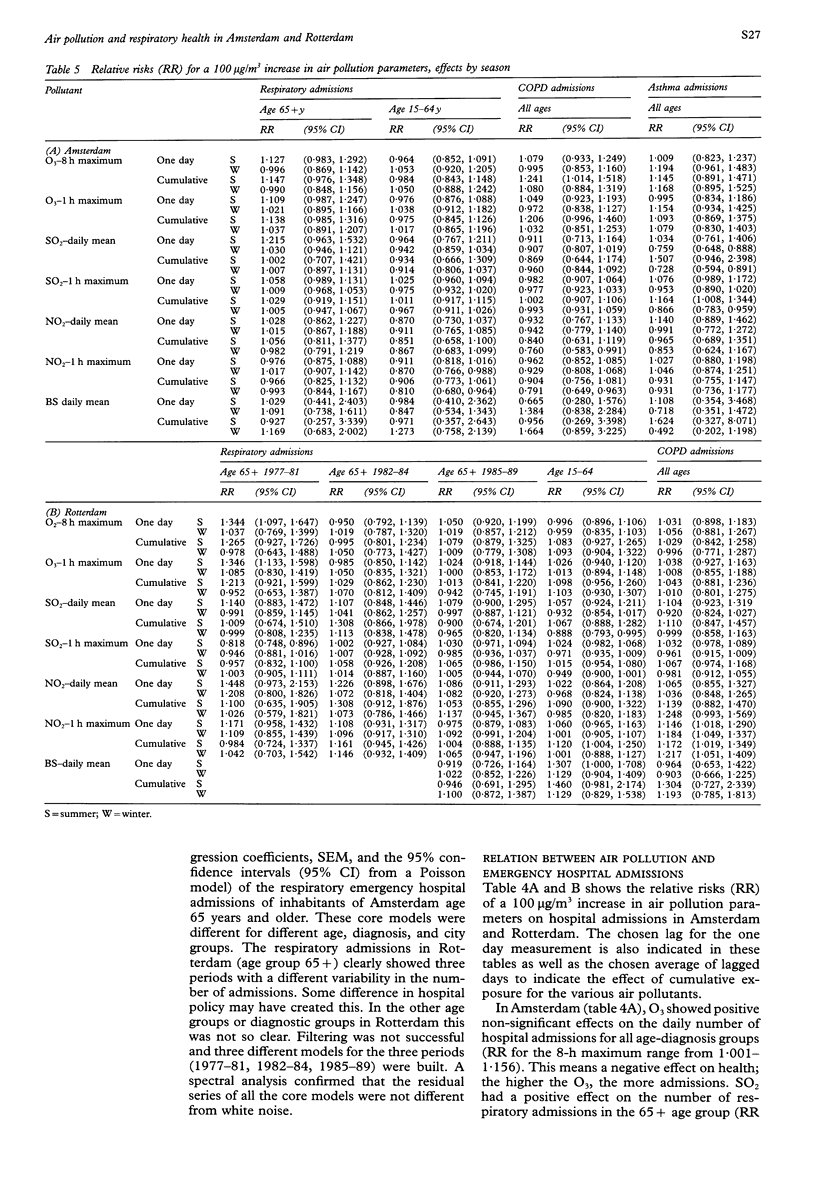
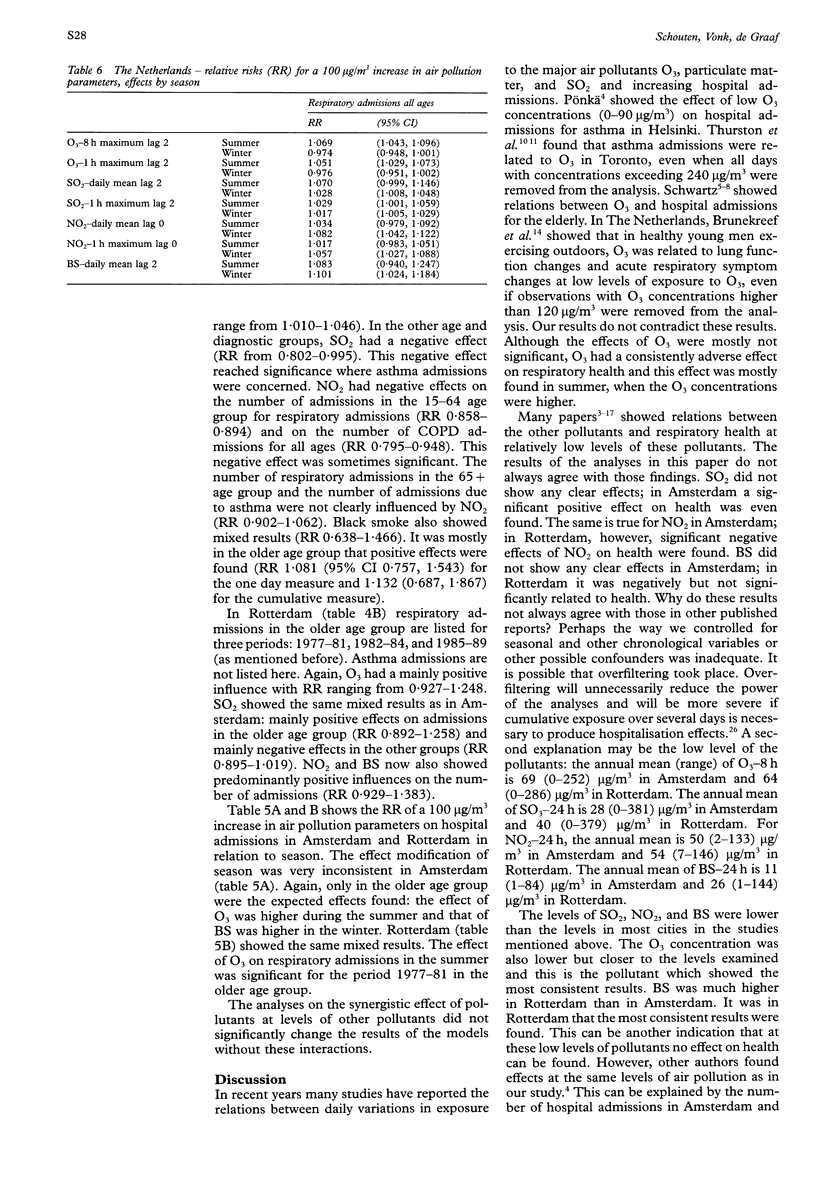
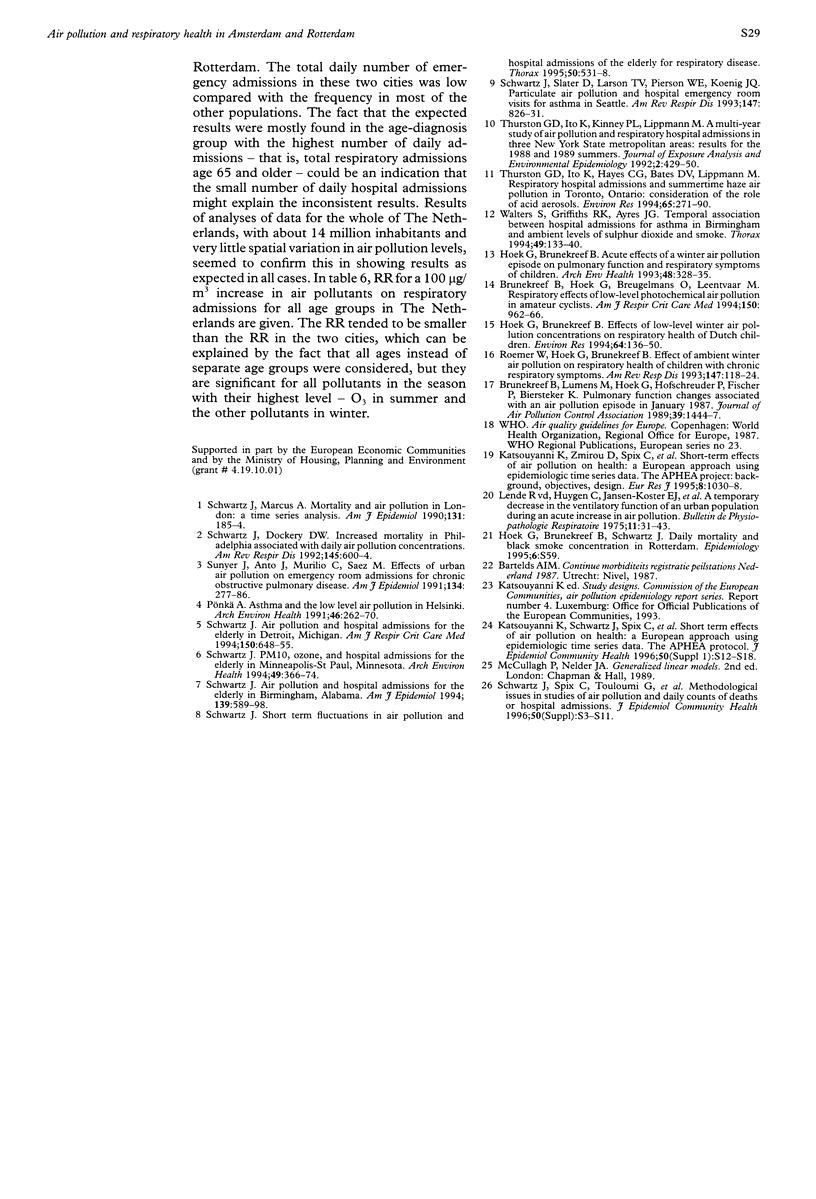
Selected References
These references are in PubMed. This may not be the complete list of references from this article.
- Brunekreef B., Hoek G., Breugelmans O., Leentvaar M. Respiratory effects of low-level photochemical air pollution in amateur cyclists. Am J Respir Crit Care Med. 1994 Oct;150(4):962–966. doi: 10.1164/ajrccm.150.4.7921470. [DOI] [PubMed] [Google Scholar]
- Brunekreef B., Lumens M., Hoek G., Hofschreuder P., Fischer P., Biersteker K. Pulmonary function changes associated with an air pollution episode in January 1987. JAPCA. 1989 Nov;39(11):1444–1447. doi: 10.1080/08940630.1989.10466638. [DOI] [PubMed] [Google Scholar]
- Hoek G., Brunekreef B. Acute effects of a winter air pollution episode on pulmonary function and respiratory symptoms of children. Arch Environ Health. 1993 Sep-Oct;48(5):328–335. doi: 10.1080/00039896.1993.9936721. [DOI] [PubMed] [Google Scholar]
- Hoek G., Brunekreef B. Effects of low-level winter air pollution concentrations on respiratory health of Dutch children. Environ Res. 1994 Feb;64(2):136–150. doi: 10.1006/enrs.1994.1012. [DOI] [PubMed] [Google Scholar]
- Katsouyanni K., Zmirou D., Spix C., Sunyer J., Schouten J. P., Pönkä A., Anderson H. R., Le Moullec Y., Wojtyniak B., Vigotti M. A. Short-term effects of air pollution on health: a European approach using epidemiological time-series data. The APHEA project: background, objectives, design. Eur Respir J. 1995 Jun;8(6):1030–1038. [PubMed] [Google Scholar]
- Lende R., Huygen C., Jansen-Koster E. J., Knijpstra S., Peset R., Visser B. F., Wolfs E. H., Orie N. G. A temporary decrease in the ventilatory function of an urban population during an acute increase in air pollution. Bull Physiopathol Respir (Nancy) 1975 Jan-Feb;11(1):31–43. [PubMed] [Google Scholar]
- Pönkä A. Asthma and low level air pollution in Helsinki. Arch Environ Health. 1991 Sep-Oct;46(5):262–270. doi: 10.1080/00039896.1991.9934386. [DOI] [PubMed] [Google Scholar]
- Roemer W., Hoek G., Brunekreef B. Effect of ambient winter air pollution on respiratory health of children with chronic respiratory symptoms. Am Rev Respir Dis. 1993 Jan;147(1):118–124. doi: 10.1164/ajrccm/147.1.118. [DOI] [PubMed] [Google Scholar]
- Schwartz J. Air pollution and hospital admissions for the elderly in Birmingham, Alabama. Am J Epidemiol. 1994 Mar 15;139(6):589–598. doi: 10.1093/oxfordjournals.aje.a117048. [DOI] [PubMed] [Google Scholar]
- Schwartz J. Air pollution and hospital admissions for the elderly in Detroit, Michigan. Am J Respir Crit Care Med. 1994 Sep;150(3):648–655. doi: 10.1164/ajrccm.150.3.8087333. [DOI] [PubMed] [Google Scholar]
- Schwartz J., Dockery D. W. Increased mortality in Philadelphia associated with daily air pollution concentrations. Am Rev Respir Dis. 1992 Mar;145(3):600–604. doi: 10.1164/ajrccm/145.3.600. [DOI] [PubMed] [Google Scholar]
- Schwartz J., Marcus A. Mortality and air pollution in London: a time series analysis. Am J Epidemiol. 1990 Jan;131(1):185–194. doi: 10.1093/oxfordjournals.aje.a115473. [DOI] [PubMed] [Google Scholar]
- Schwartz J. PM10, ozone, and hospital admissions for the elderly in Minneapolis-St. Paul, Minnesota. Arch Environ Health. 1994 Sep-Oct;49(5):366–374. doi: 10.1080/00039896.1994.9954989. [DOI] [PubMed] [Google Scholar]
- Schwartz J. Short term fluctuations in air pollution and hospital admissions of the elderly for respiratory disease. Thorax. 1995 May;50(5):531–538. doi: 10.1136/thx.50.5.531. [DOI] [PMC free article] [PubMed] [Google Scholar]
- Schwartz J., Slater D., Larson T. V., Pierson W. E., Koenig J. Q. Particulate air pollution and hospital emergency room visits for asthma in Seattle. Am Rev Respir Dis. 1993 Apr;147(4):826–831. doi: 10.1164/ajrccm/147.4.826. [DOI] [PubMed] [Google Scholar]
- Schwartz J., Spix C., Touloumi G., Bachárová L., Barumamdzadeh T., le Tertre A., Piekarksi T., Ponce de Leon A., Pönkä A., Rossi G. Methodological issues in studies of air pollution and daily counts of deaths or hospital admissions. J Epidemiol Community Health. 1996 Apr;50 (Suppl 1):S3–11. doi: 10.1136/jech.50.suppl_1.s3. [DOI] [PMC free article] [PubMed] [Google Scholar]
- Sunyer J., Antó J. M., Murillo C., Saez M. Effects of urban air pollution on emergency room admissions for chronic obstructive pulmonary disease. Am J Epidemiol. 1991 Aug 1;134(3):277–289. doi: 10.1093/oxfordjournals.aje.a116081. [DOI] [PubMed] [Google Scholar]
- Thurston G. D., Ito K., Hayes C. G., Bates D. V., Lippmann M. Respiratory hospital admissions and summertime haze air pollution in Toronto, Ontario: consideration of the role of acid aerosols. Environ Res. 1994 May;65(2):271–290. doi: 10.1006/enrs.1994.1037. [DOI] [PubMed] [Google Scholar]
- Thurston G. D., Ito K., Kinney P. L., Lippmann M. A multi-year study of air pollution and respiratory hospital admissions in three New York State metropolitan areas: results for 1988 and 1989 summers. J Expo Anal Environ Epidemiol. 1992 Oct-Dec;2(4):429–450. [PubMed] [Google Scholar]
- Walters S., Griffiths R. K., Ayres J. G. Temporal association between hospital admissions for asthma in Birmingham and ambient levels of sulphur dioxide and smoke. Thorax. 1994 Feb;49(2):133–140. doi: 10.1136/thx.49.2.133. [DOI] [PMC free article] [PubMed] [Google Scholar]


